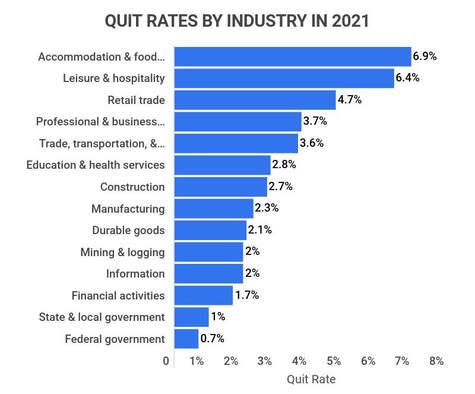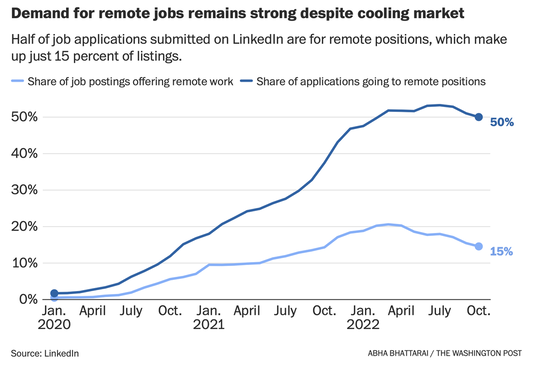|
In the coming weeks, we’ll be sharing articles that dive more into what drives educators to stay or quit their work in schools, and posts about shifts in hiring practices to adapt to a new hiring environment. You’ll see them in the members-only newsletter, Meet the Moment, for the Association for Academic Leaders. Your school hasn’t joined yet? Find out more about membership. Association Members: Navigating the 2023 Hiring Landscape - Part II is live in the member Portal.
National data and trends back this up. Whereas the media reported incessantly about “The Great Resignation” throughout 2021, the trend continued and perhaps even accelerated in 2022. The education sector was not immune from this trend, as it has been in other volatile times, as seen in this chart (source). Added on top of increased resignations is an increase in behaviors that some are calling quiet quitting. “Quiet quitting refers to opting out of tasks beyond one’s assigned duties and/or becoming less psychologically invested in work. Quiet quitters continue to fulfill their primary responsibilities, but they’re less willing to engage in activities known as citizenship behaviors: no more staying late, showing up early, or attending non-mandatory meetings.” (source) There are two other national trends that Academic Leaders should be aware of. The first is that the demand for remote work has never been greater. Just look at this recent analysis from the Washington Post. Pre-pandemic less than 5% of job applications went to remote positions and less than 3% of openings were for remote positions. Today, more than 50% (!) of applications are going to remote positions and 15% of openings are for remote positions (source). At One Schoolhouse, we’ve been hiring a lot recently, both for part-time faculty and full-time administrators. Both candidate pools have never been stronger. The second national trend that’s getting fewer headlines is called shift shock. “Shift Shock is that feeling when you start a new job and realize, with either surprise or regret, that the position or company is very different from what you were led to believe.” (source) I like to think of this in our industry as “other duties as assigned.” Shift shock is a key factor of those “late quits” I mentioned earlier: employees leaving positions with little notice (or regret) if either the company or the job does not meet what was advertised in the job description or application process.
I’m an optimist and problem solver by nature. So, although these challenges exist, there are things we can do as Academic Leaders to solve for or mitigate them.
0 Comments
Leave a Reply. |
Don't miss our weekly blog posts by joining our newsletter mailing list below:AuthorsBrad Rathgeber (he/him/his) Archives
July 2024
Categories |




 RSS Feed
RSS Feed